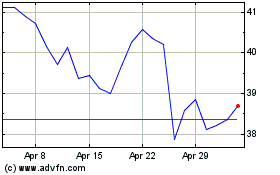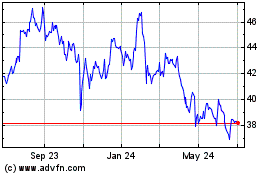Google parent Alphabet Inc. is rethinking its high-speed
internet business after initial rollouts proved more expensive and
time consuming than anticipated, a stark contrast to the fanfare
that greeted its launch six years ago.
Alphabet's internet provider, Google Fiber, has spent hundreds
of millions dollars digging up streets and laying fiber-optic
cables in a handful of cities to offer web connections roughly 30
times faster than the U.S. average.
Now the company is hoping to use wireless technology to connect
homes, rather than cables, in about a dozen new metro areas,
including Los Angeles, Chicago and Dallas, according to people
familiar with the company's plans. As a result Alphabet has
suspended projects in San Jose, Calif., and Portland, Ore.
Meanwhile, the company is trying to cut costs and accelerate its
expansion elsewhere by leasing existing fiber or asking cities or
power companies to build the networks instead of building its
own.
Google's announcement in 2010 of its Fiber project sparked high
expectations at a time when telephone companies were perceived as
moving slowly in rolling out faster broadband service. More than
1,000 cities applied and Google began service in the Kansas City
area in November 2012. The following month, Google Executive
Chairman Eric Schmidt told a conference that Fiber "isn't just an
experiment, it's a real business and we're trying to decide where
to expand next."
Today, Google Fiber has reached just six metro areas, the latest
example of the challenges facing digital companies seeking to move
into more traditional lines of business.
"If you're in the telecommunications industry for 150 years,
there are no surprises here," said Jonathan Reichental, chief
technology officer of the city of Palo Alto, Calif. "But if you're
a software company getting into the business for the first time,
this is a completely new world."
Mr. Reichental said Google Fiber executives recently told him
that plans to bring the service to Palo Alto and nearby cities are
on hold for at least six months.
In a written statement, Alphabet said, "We're continuing to work
with city leaders to explore the possibility of bringing Google
Fiber to many cities. This means deploying the latest technologies
in alignment with our product road map, while understanding local
considerations and challenges, which takes time."
The delays in Alphabet's fiber plans follow stumbles in other
arenas outside the company's core internet search and advertising
business. Alphabet stopped selling the first version of its Glass
wearable computer early last year amid privacy concerns; it has
distributed a revised version to some workplaces but hasn't
revealed an updated consumer model.
The company doesn't disclose financial results for the Fiber
unit, but consolidates them with other nonsearch businesses in its
"Other Bets" unit. That unit reported revenue of $185 million in
the latest quarter, primarily driven by Fiber, home-automation firm
Nest and life-sciences firm Verily, and an operating loss of $859
million. Fiber accounted for most of the unit's quarterly capital
expenditures of $280 million.
Alphabet hopes the investment in Google Fiber will eventually
pay off with subscriber fees and, indirectly, more clicks on its
search ads. Fiber costs $70 a month for the fastest internet
connection and an additional $60 a month for TV. Analysts estimate
a one-time cost for Alphabet of more than $500 for each home the
network reaches, not all of which subscribe.
Alphabet declined to disclose its number of subscribers. Based
on numbers reported to the U.S. Copyright Office, research firm
MoffettNathanson said in March the TV service had 53,000
subscribers total as of December.
There likely are many more subscribers for the internet service,
the firm said, but "one can't help but feel that all of this has
the flavor of a junior science fair."
Google Fiber has begun construction in five new metro areas and
announced plans to reach another dozen cities in the next few
years. Now, those dozen cities will be the test bed for a push into
wireless technology.
Google Fiber last month bought Webpass Inc., a company that
beams internet service from a fiber-connected antenna to another
antenna mounted on an apartment building. The company serves
roughly 820 buildings in five cities.
Webpass Chief Executive Charles Barr, now an Alphabet employee,
said wireless offers an opportunity to overcome the challenging
economics of building fiber networks from scratch. "Everyone who
has done fiber to the home has given up because it costs way too
much money and takes way too much time," he said.
In Kansas City, Alphabet also is testing a wireless technology
that delivers connections from antennas on street lamps. And the
company recently applied to the Federal Communications Commission
to test "experimental transmitters" for wireless connections in 24
U.S. locations during the next two years.
Google Fiber is planning a system that would use fiber for the
central network and antennas to connect each home wirelessly to
that network, according to a person familiar with the plans.
Alphabet Chairman Eric Schmidt said at the company's shareholder
meeting in June that wireless connections can be "cheaper than
digging up your garden" to lay fiber.
AT&T Inc. and Verizon Communications Inc. also have
discussed using wireless technology for the "last-mile" connection
to homes, but neither has deployed it widely.
Google Fiber is also trying other strategies to aid its
expansion In San Francisco.
In San Francisco and parts of Atlanta, the company is leasing
existing underused fiber and connecting apartment buildings rather
than single-family homes. It chose Huntsville, Ala., in part
because the city agreed to build a fiber network for Google.
In Tampa, Google Fiber is in talks with a power company to build
the fiber network. It is working with real-estate firm Irvine Co.
to pre-install fiber in new properties near Irvine, Calif., and it
hopes to strike similar deals with other builders.
The new strategies are in response to the headaches of building
a fiber network. In Kansas City, homeowners complained about
destroyed lawns and ruptured gas lines. In Nashville, Tenn., and
Louisville, Ky., competing telecom firms are blocking the company
from stringing fiber on their utility poles.
Some analysts have long suspected that Alphabet's primary goal
was to prod other broadband firms to increase their speeds.
AT&T, Comcast Corp. and Time Warner Cable, which recently was
acquired by Charter Communications Inc., have done so in some
competing markets.
Alphabet says Google Fiber is a real business. "We continue to
see Fiber as a huge market opportunity," Chief Financial Officer
Ruth Porat told investors last month. "We're being thoughtful and
deliberate in our execution path."
Shalini Ramachandran contributed to this article.
Write to Jack Nicas at jack.nicas@wsj.com
(END) Dow Jones Newswires
August 14, 2016 21:45 ET (01:45 GMT)
Copyright (c) 2016 Dow Jones & Company, Inc.
Comcast (NASDAQ:CMCSA)
Historical Stock Chart
From Mar 2024 to Apr 2024

Comcast (NASDAQ:CMCSA)
Historical Stock Chart
From Apr 2023 to Apr 2024
